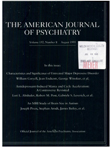Outcome of panic disorder with or without concomitant depression: A 2- year prospective follow-up study
Abstract
In a prospective 2-year follow-up study, 32 patients with panic disorder alone and 20 with panic disorder and concomitant depression were investigated. After controlled treatment with either imipramine or doxepin, patients received naturalistic treatment with antidepressants, benzodiazepines, and supportive psychotherapy. They were evaluated for anxiety, depression, and social disability at least every 3 months during the follow-up period. The data showed fluctuation of symptoms in both groups and a less favorable outcome for the patients with comorbid conditions. However, the overall outcome was better than that reported in other studies and indicates that panic disorder is quite responsive to appropriate treatment.
Access content
To read the fulltext, please use one of the options below to sign in or purchase access.- Personal login
- Institutional Login
- Sign in via OpenAthens
- Register for access
-
Please login/register if you wish to pair your device and check access availability.
Not a subscriber?
PsychiatryOnline subscription options offer access to the DSM-5 library, books, journals, CME, and patient resources. This all-in-one virtual library provides psychiatrists and mental health professionals with key resources for diagnosis, treatment, research, and professional development.
Need more help? PsychiatryOnline Customer Service may be reached by emailing [email protected] or by calling 800-368-5777 (in the U.S.) or 703-907-7322 (outside the U.S.).



